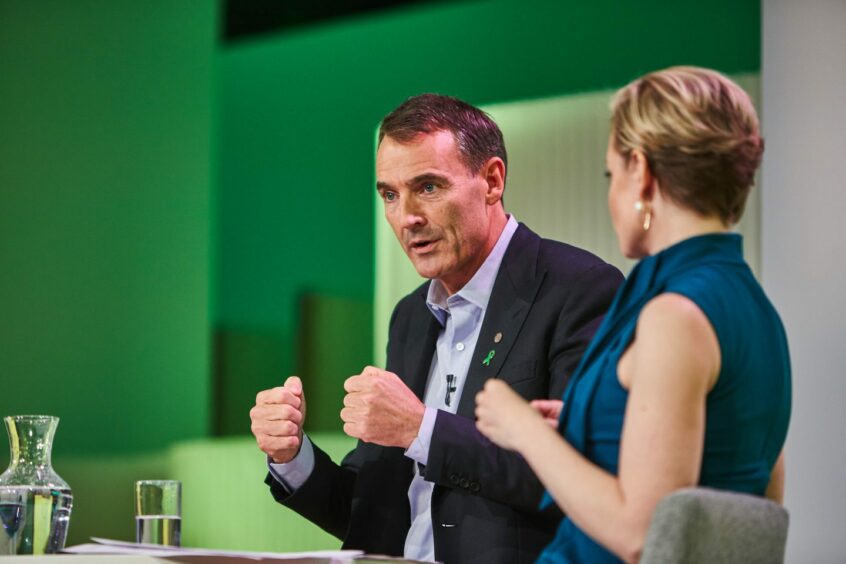
BP’s (LON:BP) chief executive has defended the company’s share buyback and dividend plans as campaigners criticised its record quarterly profits as “obscene”.
Tuesday saw BP post underlying profits of $8.4 billion for Q2 2022 – the largest quarterly earnings by the company in 14 years and triple that of the same period in 2021.
The supermajor said it would be committing a large portion of those profits to raising its quarterly dividend by 10%, to 6.006 cents per share, and launching a further $3.5 billion buyback programme over the next quarter.
However, climate campaigners said the company’s results were “a clear sign that our energy system is fundamentally broken.”
BP’s bumper profits come as soaring energy and fuel bills contribute to a worsening cost-of-living crisis. Recent estimates suggest a typical UK household energy bill will rise to more than £3,600 per year by next summer.
‘Backing Britain’
“In terms of cost of living I think we all have to recognise it’s a very difficult place for people, not just in the UK but across the world right now,” chief executive Bernard Looney said during an investor call on Tuesday morning.
“Our people inside the company get it, they want to help, and the question becomes what we can do to help – and of course what we do in the UK is we’re backing Britain.”
He pointed to the company’s commitment to invest £18bn in the UK by the end of the decade, creating over 10,000 jobs over the same period.
“The majority of that is going to be in the energy transition but also in energy security for today in hydrocarbons, and the Murlach development that we’re taking to the next stage in the North Sea is one example,” he added.
“The third thing we do is we pay taxes and when prices are higher, rightly we pay higher taxes. Now we have an Energy Profits Levy which means we’ll pay even more taxes on top of what we had already planned and that’s what we will do.”
It’s unclear at this stage how much additional tax BP or other North Sea firms will pay as a result of the levy, however the Treasury has said it hopes the scheme will raise about £5bn over the next year.
‘Following the math’
During the call, Mr Looney was also asked why the buyback had been set at $3.5bn, and whether the company would look to increase dividends further on the back of an even stronger balance sheet.
He said BP was “simply following the math,” by upping rates closer to those set before the COVID-19 pandemic.
In 2020, BP slashed its dividend by 50% and committed to buying back shares equivalent to 60% of its free cash flow. At the time, Mr Looney said the “reset” would also support the move towards becoming an “integrated energy company,” freeing up cash to invest in low-carbon technologies.
“$3.5bn takes us to exactly 60% of cumulative surplus cash since the beginning of this programme,” representing a total of about $17bn, he confirmed today.
He added that the company’s “number one priority” is a resilient dividend, and that BP would continue to assess operations based on a $40/barrel benchmark as a “prudent” way to plan.
However, Friends of the Earth Scotland criticised the buyback plans, and said projects such as Murlach would “lock in” energy inequalities.
Campaigner Freya Aitchison said: “This announcement of yet another obscene profit for BP is a clear sign that our energy system is fundamentally broken.”
“Rising energy prices are a key driver of the cost of living crisis which is plunging millions of people in the UK into fuel poverty, yet bosses and shareholders at BP are getting even richer by exploiting one of our most basic needs.”
“BP is also worsening climate breakdown and extreme weather by continuing to invest and lock us into new oil and gas projects for decades to come. Instead of allowing these companies to continue causing social and environmental devastation to boost their profits, we need to overhaul our energy system to rapidly phase out oil and gas.”
Offshore Energies UK (OEUK), which represents the offshore sector, said rising energy costs were a global phenomenon.
The organisation’s energy policy manager Will Webster said: “The increase in oil and gas company profits is because there’s been a big increase in global prices which UK industry cannot significantly influence.
“We are very concerned at the impact this will have on consumers and on the economy. But those increased profits do mean that the companies producing oil and gas from UK waters are paying a lot more taxes.”
OEUK said the sector is now paying the highest rate of tax in its history and that Office for Budget Responsibility (OBR) projections suggest it could contribute at least £12bn to Treasury coffers in 2022.
“What we can be sure of is that when global prices go down profits will also decline. But the problem that won’t go away is energy security. And security of energy supplies is a real long-term problem for the UK and Europe,” he added.
Mr Webster said that maintaining oil and gas production was necessary in the short-term, but that the UK must also shift towards low carbon energy sources like wind and hydrogen to help minimise imports and bolster energy security.
Recommended for you
